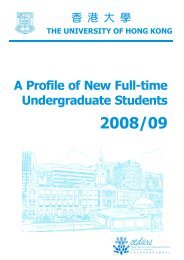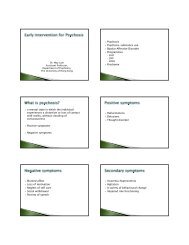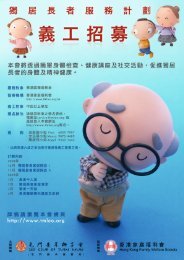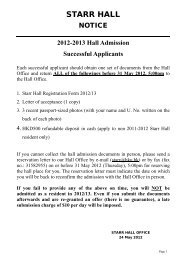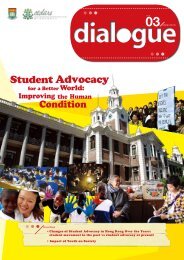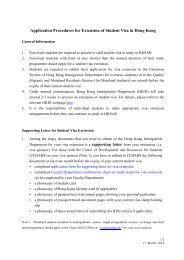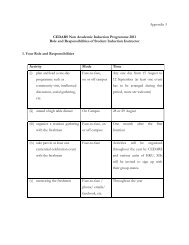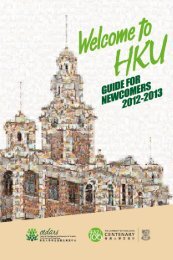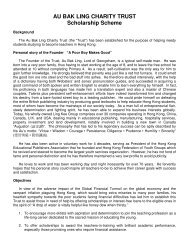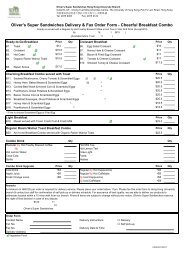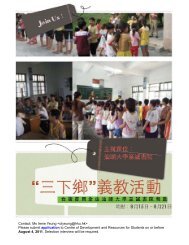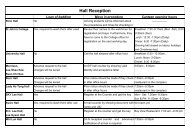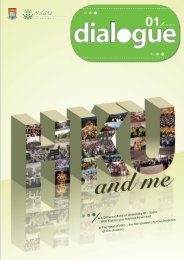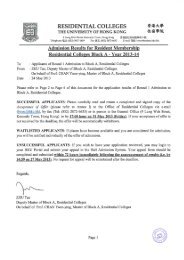April, 2011 - Cedars - The University of Hong Kong
April, 2011 - Cedars - The University of Hong Kong
April, 2011 - Cedars - The University of Hong Kong
You also want an ePaper? Increase the reach of your titles
YUMPU automatically turns print PDFs into web optimized ePapers that Google loves.
<strong>University</strong> Issues: Undergraduate Research<br />
Getting your teeth into some research<br />
<strong>The</strong> Year 4 Dental Surgery student Jack Ji Chao joined the<br />
Undergraduate Research Project launched by the Faculty <strong>of</strong> Dentistry<br />
when he was in Year 3. <strong>The</strong> project is open to all Bachelor <strong>of</strong> Dental<br />
Surgery (BDS) students who want to be involved in dental research.<br />
“I didn’t really have a clear idea about how dental research is carried<br />
out, so I took part in this project with the aim <strong>of</strong> getting a better idea<br />
<strong>of</strong> what makes up dental research, apart from the routine clinical<br />
experience we get from the normal BDS curriculum,” he says.<br />
At the 24th annual scientific meeting <strong>of</strong> the International Association for<br />
Dental Research – South-East Asian division (IADR-SEA) held in Taiwan<br />
in September 2010, Jack presented the research <strong>of</strong> his team, which consisted <strong>of</strong> another undergraduate<br />
student from the faculty, supervisors Dr Seneviratne Chaminda Jayampath, Dr X. Li and Pr<strong>of</strong>essor L.J. Jin,<br />
as well as technical experts at the faculty.<br />
“<strong>The</strong> project was about non-surgical periodontal treatment, or in layman’s terms, scaling ( 洗 牙 ). Fortunately,<br />
I won first place <strong>of</strong> the Division Travel Award Competition Junior Category, and represented the South-East<br />
Asian division at the IADR main conference in San Diego, United States, in March <strong>2011</strong>.”<br />
Jack and his team investigated the effect <strong>of</strong> this treatment from clinical, microbiological and immunological<br />
levels, aiming to reveal the reasons behind the clinical success <strong>of</strong> this treatment. “Through the research, we<br />
also detected a certain cytokine present in saliva for the first time, which may provide a new biomarker for<br />
periodontal disease detection,” he says.<br />
“Doing research during an undergraduate study is full <strong>of</strong> challenges. Time management was a huge<br />
obstacle, as the BDS curriculum itself is very intense, and we needed to use our after-school time to carry<br />
out the research. <strong>The</strong> laboratory work deals with delicate experiments on a<br />
molecular level, so even a very tiny mistake can destroy the final experiment<br />
result and the whole procedure would have to be re-done.<br />
“We put loads <strong>of</strong> effort in the project and got great support from our<br />
supervisors and many faculty members who instructed us to help solve<br />
the problems. What we gained is that we performed such laboratory<br />
experiments that we previously had only learned from text books. Moreover,<br />
we consolidated our clinical knowledge through examining the mechanism<br />
per se <strong>of</strong> the treatment. And the analysis <strong>of</strong> the data helped trained our critical<br />
thinking.”<br />
Dentistry is a pr<strong>of</strong>essional curriculum that requires pr<strong>of</strong>icient skills and solid<br />
knowledge. “By fostering the interest in research, we were able to lay down<br />
a solid knowledge base on which hands-on skills are built,” Jack says. “In<br />
future, I would love to develop more creativity in research designing and data<br />
analysis.”



